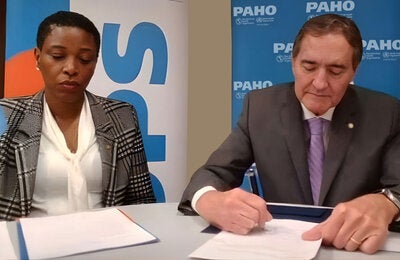Initiative for strengthening of mental health services capacity in the US-Mexico border
This initiative implemented on the US/Mexico border from 2014 to 2017 was aimed to address high rates of untreated mental health problems in settings with limited resources by training primary health care professionals and community health workers. This promising cost-effective project used the WHO's Mental Health Action Programme (mhGAP) to build primary health care professionals' capacity to treat mental disorders.
Mental and neurological disorders are among the leading causes of poor health and disability worldwide, with 300 million people suffering from depression alone. However, between 76% and 85% of people receive no treatment for their illness. In the United States/Mexico border region, these conditions affect 1 in every 5 persons, with suicide rates reaching 12.1 per 100,000 people in the US and 4.2 per 100,000 in Mexico. Border communities, in particular, face stressors that can significantly increase the risk of developing mental health problems. Some of these factors include poverty, migration and barriers to health care - both financial (lack of health insurance, low income), and structural (cultural and language).
What was achieved
- In the U.S., 270 community health workers from 9 cities in 4 border states (Texas, New Mexico, Arizona, and California) were trained in mhGAP.
- In the 10 border states in Mexico and the U.S., a total of 347 primary health care personnel were trained using the mhGAP-IG.
- On the Mexican side of the border, 286 community health workers were trained from the cities of Tijuana, Palomas, Ciudad Juarez, Ojinaga, Reynosa, Matamoros, and Nuevo Laredo.
- The CONSAME in Mexico added the mhGAP-IG as one of their indicators of mental health performance for all 32 states in Mexico, thanks to this initiative.
- Four WhatsApp groups were created and maintained active to share relevant information on mental health and provide support to other members of the group. Each group has a trainer responsible for following up on questions regarding the mhGAP-IG.



